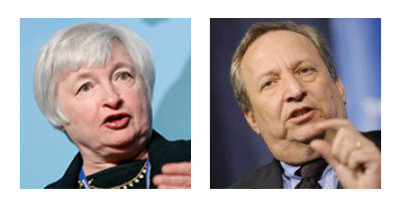
It’s open warfare over the Fed
In Washington, D.C., politics never takes a day off. But even in this city of nonstop campaigning, nobody’s ever seen anything like this: a full-scale political campaign over who should replace Ben Bernanke as the next chairman of the Federal Reserve.

This is strange for three reasons. First, because most Americans have no idea what the Federal Reserve does. Second, because most Americans have never heard of Larry Summers or Janet Yellen, the two leading candidates for the job. Third, because the choice is not decided by popular vote. President Obama alone makes that decision, subject to Senate confirmation.
On the other hand, it’s perfectly appropriate to have a heated debate over the next chair of the Fed because it’s such a powerful post, second only to the president of the United States. In fact, under Ben Bernanke, the Fed has become more powerful than ever. With a gridlocked Congress failing to enact any fiscal policy, it’s the Fed’s monetary policy — buying $85 billion in bonds a month until the job situation improves — that’s keeping the economy afloat. And the Fed’s destined to assume even more authority once key regulatory provisions of the 2010 Dodd-Frank law kick in.
Given the Fed’s increased importance, it’s curious that Larry Summers should appear on Obama’s short list. Few people in Washington have such a lousy reputation, or are more hated. Yes, everybody agrees he’s an economic expert, but his record indicates he’d take the Fed in the wrong direction. Faced with a crying need for more regulation of banks and financial institutions, Summers has always argued just the opposite.
In the late ’90s, Summers, a Robert Rubin protege, senior Treasury Department official and later treasury secretary in the Clinton administration, advocated repeal of the Glass-Steagall Act, which allowed banks to merge with insurance companies and investment houses, thus sowing the seeds for the financial crisis of 2008. He also led opposition to government regulation of derivatives, even though they’d already contributed to several financial catastrophes. Trust the banks, he told Congress in 1998. “The parties to these kinds of contract are largely sophisticated financial institutions that would appear to be eminently capable of protecting themselves.” In 2010, former President Bill Clinton admitted he’d been wrong to follow Summers’ advice.
Summers went on to become president of Harvard University, where he received a “lack of confidence” vote from the faculty after suggesting that the reason there were fewer women than men in top engineering and science jobs might be because of a “different availability of aptitude at the high end.” Forced out of Harvard, Summers migrated to D.E. Shaw & Co., a Wall Street hedge fund, where he was reportedly paid $5 million a year. Today, he’s back on Wall Street as consultant to D.E. Shaw, Citigroup, NASDAQ and others. In between, he served as director of President Obama’s National Economic Council.
Summers’ record on deregulation and his close Wall Street ties — plus the fact that President Obama has repeatedly praised his performance as a member of the administration — have made a lot of Democrats in Congress nervous that Summers seems to have the inside track. So, in a highly unusual move, a third of Senate Democrats, led by Dick Durbin and Elizabeth Warren, made a pre-emptive strike to block Summers by sending an open letter to President Obama urging him to appoint Janet Yellen instead. And so did 38 out of 62 Democratic women in the House, reminding Obama that Yellen, currently vice-chair of the Fed, is more than qualified to take the helm. She’d also be the first woman to do so.
One more reason passions run so strong about the next Fed chair: There’s more here than meets the eye. This is more than a choice between Larry Summers and Janet Yellen. It’s also a debate between the “Wall Street Wing of the Democratic Party” — represented by Robert Rubin, Larry Summers, Timothy Geithner and Gene Sperling — and the “Main Street Wing” of the party — represented by Sherrod Brown, Jeff Merkley, Bernie Sanders and Elizabeth Warren. At stake is more, or less, regulation of banks and financial institutions. And nobody will have more to say on that issue than the next chairman of the Federal Reserve.
If President Obama really wants to avoid another Wall Street-driven economic collapse, not only should he not appoint Larry Summers as the next chair of the Fed, he should not even consider him for the job.
(Bill Press is host of a nationally-syndicated radio show, the host of “Full Court Press” on Current TV and the author of a new book, “The Obama Hate Machine,” which is available in bookstores now. You can hear “The Bill Press Show” at his website: billpressshow.com. His email address is: bill@billpress.com.)
(c) 2013 Tribune Content Agency, LLC.


